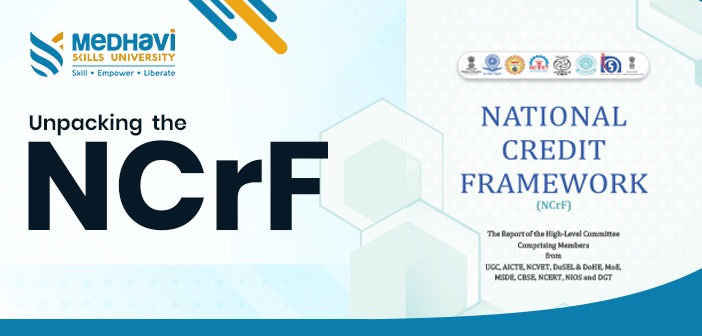
The National Credit Framework (NCrF) represents a significant step forward in India’s efforts to integrate education with economic development. Rooted in the transformative vision of the National Education Policy 2020 (NEP 2020), the NCrF aims to create a dynamic and flexible education system that fosters employability, skill development, and lifelong learning. As Higher Education Institutions (HEIs) face the challenge of rising enrollments, the question is, how often do they reflect on this relationship and reconsider aligning education with the evolving job market, especially as enrollment is expected to rise from 40 million to 92 million by 2035?
Author : Mr. Pravesh Dudani, Founder and Chancellor, Medhavi Skills University
The NCrF offers a comprehensive approach to bridging the gap between academic and vocational education, ensuring seamless mobility and recognition of prior learning across diverse disciplines. With mechanisms like the Academic Bank of Credits (ABC), modular learning, and multiple entry-exit options, the framework provides students with greater flexibility in shaping their educational journey. As India moves toward this paradigm shift, the NCrF stands poised to redefine learning outcomes, promote skill-based education, and ultimately contribute to sustainable economic growth.
National Education Policy 2020: A Transformative Mission
With the launch of the National Education Policy 2020 (NEP 2020), India aims to transform education to be contemporary, industry-relevant, and beneficial for all stakeholders. The policy advocates for higher education that leads to sustainable employment or enhanced employability through practical and skill-based learning. Therefore, aligning academic learning with job and industry requirements is essential.
To realize the intent and objectives of National Education Policy 2020, the Government of India constituted a High-Level Committee (HLC) to formulate the National Credit Framework (NCrF). Members from UGC, AICTE, NCVET, NIOS, CBSE, NCERT, Department of School Education and Learning & Department of Higher Education, Ministry of Education, DGT, and Ministry of Skill Development were part of the HLC. National Credit Framework (NCrF), is a meta-framework aimed at operationalizing many goals of NEP 2020, including, seamless integration of general and vocational education; equivalence and mobility across disciplines and recognition of experiential and digital learning.
A Paradigm Shift in Education
NCrF envisions holistic education as a continuum, proposing a paradigm shift in crediting learning across school, college, and university levels, as well as informal or work-based learning. Credits can be earned for sports, performing arts, academic courses, practical training, apprenticeships, internships, volunteering, digital learning, and previous work experience, bridging curricular and extra-curricular activities.
The framework divides education into eight competency levels, starting with school and culminating in doctoral research. The credit system is based on the successful completion of a level, with one credit equating to 30 learning hours. Students are expected to earn a minimum of 40 credits annually to advance to the next level. By the end of an undergraduate course, students should earn 120 or 160 credits, which can be stored in the Academic Bank of Credits (ABC).
Key Mechanisms of the National Credit Framework
The Establishment and Operationalisation of the Academic Bank of Credits
The ABC is a digital bank where candidates’ education journey is stored in the form of credits earned for each course. This digital platform integrates higher education, vocational education, technical education, training, and skilling by allowing students to earn, accumulate, and redeem credits. The NCrF requires for every HEI to register themselves and their students on the ABC portal and create an APAAR (Automated Permanent Academic Account Registry). Credits stored in the ABC Portal are normally valid for seven years, post which entry/re-entry into a programme will be based on the validation of prior learning outcomes through fresh assessments. In case of Vocational Education Training and Skilling based courses, the validity of credits earned may vary, which shall be defined within the course itself.
The Promotion of Skill-based Education
The NEP 2020 and NCrF make it possible for education to be better integrated with the skilling ecosystem. Traditional HEI’s are allowed to have 50% of their total credit requirement through skill-based courses/curriculum. The NCrF also instigated the promotion of Skill Universities in India where up to 70% of the curriculum can be comprised of skill components. This should be done in a manner where academic equivalence is established through the learning outcome of each course/subject.

Learning Outcome Mapping
Every University/Autonomous institution will frame curriculums as per the guidelines given in NHEQF specifying the outcomes and competencies of the courses. Following are the points which may be taken into consideration while framing the Learning Outcome of the courses:
-
- Every course (paper) must have well-defined learning outcomes and competencies which are measurable and duly aligned with NHEQF/ NSQF.
- Such learning outcomes and competencies of a course must have a co-relation with the course objectives.
- Learning outcomes and competencies must be framed from the perspective of what the student will be able to do after completion of the course, stating
-
-
- What knowledge and understanding he/she will be able to develop/ describe,
- What practical/ hands-on skills he/she will be able to demonstrate,
- Where and how he/she will be able to apply the knowledge and skills so acquired.
- What analysis will he/she be able to do
- What innovation can be done, created or developed using the knowledge and skills so gained?
-
Recognition of Prior Learning
The NCrF enables provisions for Recognition of Prior Learning for students and workers which creditizes their learning through various formal, non-formal, traditional or any other means. RPL is based on the Learning Outcome based assessment approach for recognizing learnings, this means, candidate would have to be assessed on the practical and theoretical outcomes of their prior learnings, which then need to be mapped to the eligibility requirements of the course and track they want to enrol themselves into.
Assessment Optimization
The NCrF provides that the mode and system of assessments have to be guided by Learning Outcomes and focuses on formative and continuous assessments rather than summative ones. The assessments are not just limited to pen-paper or practical examinations. They expand to AI based assessments, peer to peer randomized assessment, self-assessment after self-learning, industry validation and much more. This opens horizons for validating learnings through various mechanisms and understanding different strengths of each student, something that was not possible earlier.
Multiple Entry – Multiple Exit
There are lakhs of candidates every year who need to drop out of their courses due to various reasons. Getting back into the education system from where they left off becomes a difficulty. The NCrF, through systems such as the ABC and the RPL, creates pathways for candidates to enter and exit courses at multiple points. HEIs can make stackable courses where the first year can amount to a UG certificate, the second to a UG Diploma, the third to a Bachelors Degree, and the fourth year to a Bachelor Honours or equivalent degree. Here, the candidate can take an exit in any year and earn a relevant certification. Utilizing this certification (and the credits stored in the ABC), the candidate can take lateral entry into the programme at a later point in time. The same can be applicable for PG courses.
The Path Forward
Implementing NEP 2020 involves HEIs adopting NCrF and re-imagining their programs to remove hierarchies and distinctions. Raising awareness among parents and addressing challenges in understanding the framework are crucial steps. Starting with ‘qualifications’ and ‘credits’ can lay the foundation for lifelong learning, ultimately rethinking ‘learning outcomes’ and ‘certifications.’
The NCrF promotes flexibility and agility, enabling HEIs to adapt to the changing job market by offering modular credits and innovative programs. It fosters equivalence and mobility, recognizing practical and vocational training alongside academic achievements. Inclusivity is emphasized, breaking traditional barriers to learning and helping individuals make informed career choices.
Subscribe to our YouTube channel for more updates:
Subscribe on YouTube


